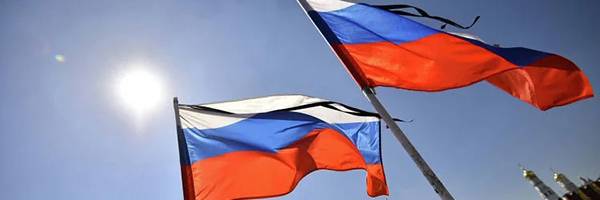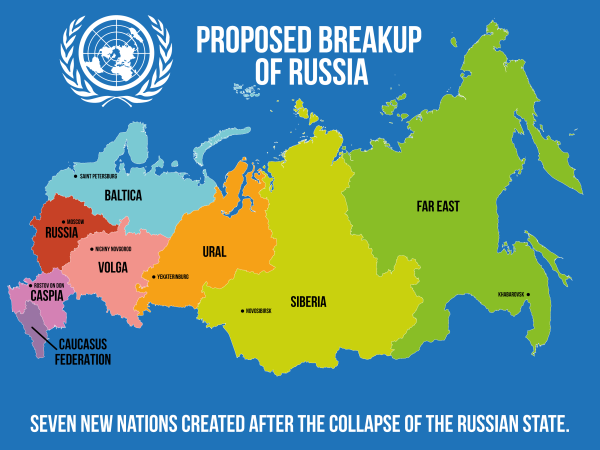The Plan of “Breaking up the Country”. “The Decolonization” of Russia, Fomenting Separatism and “Ethnic Nationalism”

Active efforts, including ample funds, are being spent on fomenting ethnic nationalism among Russia’s many ethnic groups.
Meetings are convened outside Russia in order to stimulate separatism along ethnic lines.
The plan of breaking up the country is sometimes labelled “decolonization of Russia”. Since most fervent opposition to Russia is articulated by political groups that consider themselves progressive (such as the Democratic Party in the United States or the Green Party in Germany) the concept of decolonization makes this idea appear anti-imperialist and progressive.
But within Russia, another kind of decolonization is underway. Intellectuals, artists, and politicians argue for the liberation of the country not only from economic and technological dependence on the West, but also from cultural colonization that has triumphed since the days of perestroika. The dismantlement of the Soviet Union was not only ”a geopolitical catastrophe”, as Putin once said. It was also a psychological blow to millions of Soviet citizens, not only Russians. All the sacrifices to build a qualitatively different society and to raise the country from two horrifically costly world wars suddenly appeared to have been made in vain.
The population endured a profound loss of self-confidence and self-respect. It fell into a sort of collective depression as the neoliberal reforms of the 1990s plunged the majority into abject poverty.
Russia was on her knees, in the grip of the kind of stunned inertia and mental enslavement that people colonized by Western empires had experienced before. Russia was well on its way to becoming a true colony of the West. While Putin was the first foreign leader to call Washington after the attack on the Twin Towers in 2001, he was floating the idea of Russia joining NATO.
Intellectual concepts, artistic tastes, business practices and government policies were uncritically imported and proclaimed superior simply because they were coming from the West.
The language absorbed a heavy dose of often superfluous Americanisms. Historical continuity was snubbed in favour of imitation. Pro-Western reformers consciously destroyed much of the technological and industrial potential of the country with the avowed ideological goal of uprooting all traces of socialism.
Aeroflot, formerly the world’s largest airline, used to fly exclusively Soviet-made planes. Within a few years of post-Soviet reforms, it switched to Western-made planes, most of which are currently grounded due to Western sanctions. Nowadays, belated efforts are being made to revive the local civilian aircraft industry.
For over three decades, a powerful “comprador bourgeoisie” headed by neoliberal oligarchs took root in the country and its corridors of power. These people viewed the West as a reliable and generous chum. They developed infinite trust in globalization that promised uninterrupted supply of consumer goods, industrial equipment, and electronic components. Western banks were used not only for deposits of private funds but even to hold Russia’s sovereign reserves.
Most of these are now frozen and may be expropriated altogether. Yet, many true believers in the “rules-based order” under Washington’s aegis continue to wield influence in Moscow. They hope against hope that once the war is over everything will return to business as usual.
But a struggle is underway to free the country from the colonial dependence these intellectuals, politicians, businessmen and financiers promoted and benefited from for decades.
Russian television and film industries absorbed American influence with a gusto. While serials may be locally made, they follow plot lines and fashions taken from elsewhere. Whether or not one appreciates Soviet films and literature, there is little doubt they were authentic and original. Much of current Russian cultural production is derivative and imitative. Cheap entertainment has invaded most TV studios, leaving one channel, Kultura, as a kind of nature reserve for quality programmes, often consisting of films made in the USSR.
The education system has promoted egoism, competition, and unbridled striving for money.
Ayn Rand’s books became the gospel for millions of confused ex-Soviets. Individual consumption was to replace socialist values, and even minimal community concerns. An erstwhile education minister openly argued for producing educated consumers, rather than scientists, engineers, or intellectuals.
There is little wonder that a lot of young men fled the country when mobilization to the armed forces was declared last Fall. Patriotism had long become a dirty word among the sophisticated urban elites. Albeit clumsy, efforts are being made to change these educational policies, and time will tell how effective these will be.
Russia is awakening from the spell of submission to the West, glorification of its ideology and adulation of its models. Disdain and barely concealed efforts to bring Russia to heel on the part of the United States, have gone a long way to contribute to that trend. Much as the colonized world rose to throw off the shackles of colonial rule, Russia is breaking free from the mental straitjacket of the past thirty years. Patriotism, volunteering, and social concerns are making a comeback.
The conflict in Ukraine has catalyzed that epochal transition. Decolonization has touched Russia’s foreign policy discourse. Putin and Lavrov no longer refer to “our Western partners” since there is active warfare going on between Russia and NATO, something that Russian, Ukrainian and Western officials now openly admit.
However much Russian leaders criticize their Soviet predecessors, they face similar, possibly more formidable, challenges. As they try to consolidate alliances and seek new ones, they invoke the Soviet heritage of support for anticolonialism. Many countries in Asia, Africa and Latin America have long harboured aspirations for national sovereignty and a multipolar world.
Now Russia encourages them to resume their struggle against Western hegemony. These countries have not joined Western sanctions against Russia and are watching closely how she is standing up to the collective West. Thus, Russia’s attempts at mental and economic decolonization are bound to encourage decolonization elsewhere.
*
This article was originally published on Pressenza.
Professor Yakov M. Rabkin is Professor Emeritus of History at the University of Montreal, co-editor of Demodernization: A Future in the Past (Columbia University Press). He is a longstanding contributor to Global Research.

